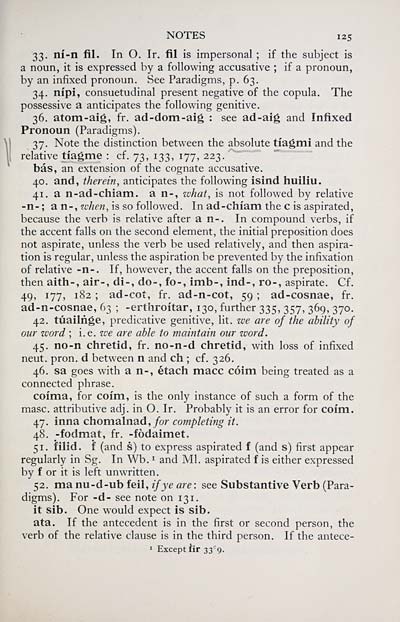Download files
Complete book:
Individual page:
Thumbnail gallery: Grid view | List view

NOTES 125
33. ní-n fil. In O. Ir. fil is impersonal ; if the subject is
a noun, it is expressed by a following accusative ; if a pronoun,
by an infixed pronoun. See Paradigms, p. 63.
34. nípi, consuetudinal present negative of the copula. The
possessive a anticipates the following genitive.
36. atom-aig, fr. ad-dom-aig : see ad-aig and Infixed
Pronoun (Paradigms).
37. Note the distinction between the absolute tíagmi and the
relative tíagme : cf. 73, 133, 177, 223.
bás, an extension of the cognate accusative.
40. and, therem, anticipates the foUowing isind huiliu.
41. a n-ad-chiam. a n-, what, is not followed by relative
-n- ; a n-, 7vhen, is so followed. In ad-chíam the c is aspirated,
because the verb is relative after a n-. In compound verbs, if
the accent falls on the second element, the initial preposition does
not aspirate, unless the verb be used relatively, and then aspira-
tion is regular, unless the aspiration be prevented by the infixation
of relative -n-. If, however, the accent falls on the preposition,
then aith-, air-, di-, do-, fo-, imb-, ind-, ro-, aspirate. Cf.
49, 177, 182 ; ad-cot, fr. ad-n-cot, 59 ; ad-cosnae, fr.
ad-n-cosnae, 63 ; -erthroítar, 130, further 335, 357, 369, 370.
42. túailnge, predicative genitive, lit. we are of the ability of
our zvord ; i.e. íve are able to maintain oiir zvord.
45. no-n chretid, fr. no-n-d chretid, with loss of infixed
neut. pron. d between n and ch ; cf. 326.
46. sa goes with a n-, étach macc cóim being treated as a
connected phrase.
coíma, for coím, is the only instance of such a form of the
masc. attributive adj. in O. Ir. Probably it is an error for coím.
47. inna chomalnad,/or completing it.
48. -fodmat, fr. -fodaimet.
51. filid. f (and s) to express aspirated f (and s) first appear
regularly in Sg. In Wb. i and Ml. aspirated f is either expressed
by f or it is left unwritten.
52. ma nu-d-ub feil, ifye are: see Substantive Verb (Para-
digms). For -d- see note on 131.
it sib. One would expect is sib.
ata. If the antecedent is in the first or second person, the
verb of the relative clause is in the third person. If the antece-
I Except íir 33-9.
33. ní-n fil. In O. Ir. fil is impersonal ; if the subject is
a noun, it is expressed by a following accusative ; if a pronoun,
by an infixed pronoun. See Paradigms, p. 63.
34. nípi, consuetudinal present negative of the copula. The
possessive a anticipates the following genitive.
36. atom-aig, fr. ad-dom-aig : see ad-aig and Infixed
Pronoun (Paradigms).
37. Note the distinction between the absolute tíagmi and the
relative tíagme : cf. 73, 133, 177, 223.
bás, an extension of the cognate accusative.
40. and, therem, anticipates the foUowing isind huiliu.
41. a n-ad-chiam. a n-, what, is not followed by relative
-n- ; a n-, 7vhen, is so followed. In ad-chíam the c is aspirated,
because the verb is relative after a n-. In compound verbs, if
the accent falls on the second element, the initial preposition does
not aspirate, unless the verb be used relatively, and then aspira-
tion is regular, unless the aspiration be prevented by the infixation
of relative -n-. If, however, the accent falls on the preposition,
then aith-, air-, di-, do-, fo-, imb-, ind-, ro-, aspirate. Cf.
49, 177, 182 ; ad-cot, fr. ad-n-cot, 59 ; ad-cosnae, fr.
ad-n-cosnae, 63 ; -erthroítar, 130, further 335, 357, 369, 370.
42. túailnge, predicative genitive, lit. we are of the ability of
our zvord ; i.e. íve are able to maintain oiir zvord.
45. no-n chretid, fr. no-n-d chretid, with loss of infixed
neut. pron. d between n and ch ; cf. 326.
46. sa goes with a n-, étach macc cóim being treated as a
connected phrase.
coíma, for coím, is the only instance of such a form of the
masc. attributive adj. in O. Ir. Probably it is an error for coím.
47. inna chomalnad,/or completing it.
48. -fodmat, fr. -fodaimet.
51. filid. f (and s) to express aspirated f (and s) first appear
regularly in Sg. In Wb. i and Ml. aspirated f is either expressed
by f or it is left unwritten.
52. ma nu-d-ub feil, ifye are: see Substantive Verb (Para-
digms). For -d- see note on 131.
it sib. One would expect is sib.
ata. If the antecedent is in the first or second person, the
verb of the relative clause is in the third person. If the antece-
I Except íir 33-9.
Set display mode to: Large image | Transcription
Images and transcriptions on this page, including medium image downloads, may be used under the Creative Commons Attribution 4.0 International Licence unless otherwise stated. ![]()
| Early Gaelic Book Collections > Matheson Collection > Old-Irish paradigms and selections from the Old-Irish glosses > (141) |
|---|
| Permanent URL | https://digital.nls.uk/80951251 |
|---|
| Description | Items from a collection of 170 volumes relating to Gaelic matters. Mainly philological works in the Celtic and some non-Celtic languages. Some books extensively annotated by Angus Matheson, the first Professor of Celtic at Glasgow University. |
|---|
| Description | Selected items from five 'Special and Named Printed Collections'. Includes books in Gaelic and other Celtic languages, works about the Gaels, their languages, literature, culture and history. |
|---|

